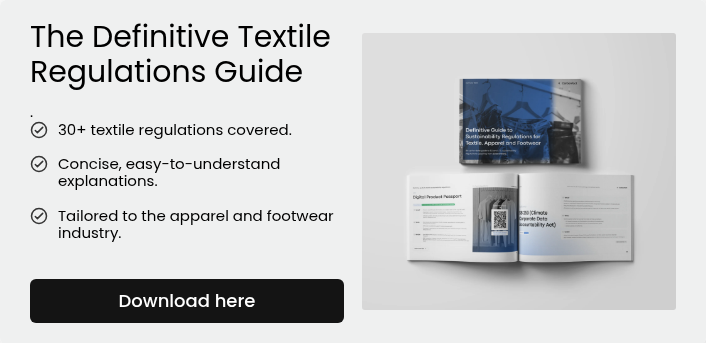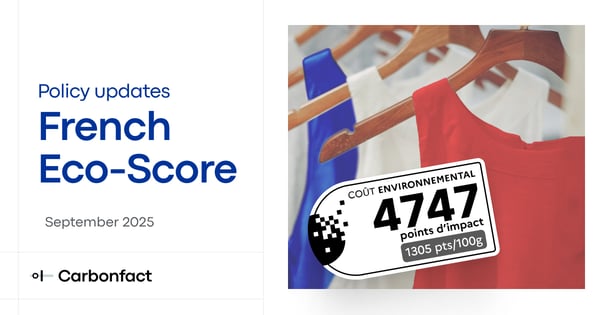In our previous article, we delved into EU and EU membership state policies relevant to the fashion industry; however, if your company is located in the United States or conducts business there, here is a list of the key regulations that should be on your radar:
California’s Climate Corporate Data Accountability Act (SB 253)
Status: ✅ Approved law
SB 253 (the Climate Corporate Data Accountability Act) introduces mandatory greenhouse gas (GHG) emissions reporting for large brands doing business in California. For apparel and footwear brands, this marks the start of regulated emissions disclosure at the state level.
SB 253 applies to large companies (over $1 billion in annual revenue) doing business in California and requires disclosure of greenhouse gas emissions. Reporting starts in 2026 with Scope 1 and Scope 2 emissions, and expands to Scope 3 emissions from 2027.
Read our deep dive into SB 253 requirements for fashion brands here.
California’s Greenhouse Gases: Climate-Related Financial Risk Bill (SB 261)
Status: Enforcement paused
SB 261 (the Climate-Related Financial Risk Act) requires large brands to assess and disclose how climate change could impact their financial performance and operations. Unlike SB 253, SB 261 does not focus on emissions data, but on climate-related risks and how companies manage them.
These risks can be divided into two categories: physical risks and transition risks.
- Physical risks are the risks caused by the physical effects of climate change (extreme weather, rising sea levels, changes in temperature) that can damage or destroy property, disrupt operations, and increase costs.
- Transition risks are the risks caused by the transition to a low-carbon economy. These risks can include changes in government regulations, technological innovation, and consumer preferences, which can lead to stranded assets, lost market share, and increased competition.
SB 261 applies to companies with over $500 million in revenue and requires disclosure of climate-related financial risks. Enforcement of SB 261 is currently paused and being reviewed.
Uyghur Forced Labor Prevention Act
Status: ✅ Approved law
The Uyghur Forced Labor Prevention Act addresses forced labor practices among ethnic minorities in the Xinjiang Uyghur Autonomous Region of China. This act was signed into law in 2021. As of 2022, any American fashion company importing products from the Xinjiang region needs to prove that no forced labor was used in the manufacturing process.
For fashion brands, cotton and apparel have been high-priority enforcement sectors since the law took effect. While the U.S. has continued to update its enforcement strategy and expand the UFLPA Entity List, the most recent additions relate to non-textile sectors.
SEC Climate Disclosure
Status: Enforcement suspended
U.S. Securities and Exchange Commission (SEC) proposed a rule requiring publicly traded companies to include climate-related disclosures in their annual reports and registration statements. Although the SEC’s climate disclosure rule was adopted in 2024, it was paused due to legal challenges, and in 2025, the SEC stopped defending it in court. As a result, the rule is not in force. If implemented, it would have required companies to disclose material climate-related risks and their Scope 1 and Scope 2 greenhouse gas emissions.
New York Fashion Act
Status: Proposal
If passed, the New York Fashion Act would require fashion brands to provide detailed reporting on the environmental and social impact of their products. This includes identifying, preventing, and taking remedial measures to address the negative impacts of their corporate actions and those of their supply chain.
The act also requires apparel brands to implement enhanced due diligence procedures in their operations. It would apply to any fashion business with an annual global revenue of more than $100M. However, the act is still under legislative review.
The FABRIC Act
Status: Proposal
Introduced in the US Senate in May 2022, the Fashion Accountability and Building Real Institutional Change (FABRIC) Act addresses both the environmental and social impact of outsourcing garment production. It would encourage transparency in the fashion supply chain, ethical production standards, and a 30% tax credit for clothing producers willing to relocate their manufacturing to the US. In terms of implementation, the FABRIC Act still needs to pass the Senate and then the House of Representatives.
Extended Producer Responsibility in the U.S.
Instead of leaving consumers and the national governments to deal with textile waste, Extended Producer Responsibility schemes place this responsibility on the producers. Fashion brands are held accountable for their products throughout their lifecycle, which includes end-of-life. A few of the U.S. states have begun to roll out EPR schemes:
California – Textile EPR requirements
Status: ✅ Approved bill (implementation phase)
In September 2024, California passed the SB 707 – Responsible Textile Recovery Act, becoming the first U.S. state to introduce a mandatory Extended Producer Responsibility scheme for textiles.
Obligations for Textile Brands
The law requires producers of apparel and textiles sold in California to participate in an approved Producer Responsibility Organization (PRO). The PRO will be responsible for developing and operating a statewide system for the collection, repair, reuse, sorting, and recycling of covered textile products.
Which Fashion Brands Must Comply
Under California’s textile EPR law, the “producer” is the textile company responsible for placing the product on the market. Responsibility follows a clear order:
- The manufacturer of a product who owns or licenses the brand or trademark under which it is sold.
- The brand owner or exclusive licensee, if no such manufacturer exists in California.
- The importer of a product if neither the manufacturer nor the licensee are present.
- If none of the above are present in the state, the distributor, retailer, or wholesaler selling the product is responsible.
California’s textile EPR applies to apparel, footwear, and other textile products sold in the state. Detailed product scope and exclusions will be clarified through implementing regulations and PRO plans. In short:
- The law (SB 707) says what must exist.
- Implementing regulations will lay out how the law works in detail.
- PRO plans say how producers will meet the requirements.
Timeline
SB 707 is implemented in phases:
- By January 1, 2026: PRO must submit a detailed plan to the state explaining how it will run the textile EPR system, including how products will be collected, reused, repaired, recycled, funded, and reported, for state approval.
- By July 1, 2026: Textile producers must participate in an approved PRO once a plan is approved.
- Following approval: The system is rolled out progressively, in line with approved plans.
Producers that fail to comply with SB 707 may be subject to penalties, which can reach:
- Up to $10,000 per day.
- And up to $50,000 per day for intentional or repeated violations.
New York – Textile EPR requirements
Status: Proposal
New York is considering a textile Extended Producer Responsibility (EPR) framework through Senate Bill S3217, introduced in January 2025. The bill is not yet law, and no obligations currently apply.
Expected Obligations for Textile Brands
If adopted, the bill would require textile producers to:
- Finance and manage end-of-life treatment for textile products sold in New York.
- Participate in a collective collection system (PRO) or operate an approved individual system.
- Provide free and convenient take-back options for consumers.
- Report annually on the amount of textile waste collected (by weight), how it was treated (reuse, recycling, disposal), and whether the collection program met its targets.
Timeline
If the bill is enacted:
- By 31 December 2026: Producers must submit a collection program plan to the state, individually or through a representative organization.
- By 1 July 2027: Producers must implement or participate in an approved textile collection system.
- After this date, covered products could not be sold in New York unless the producer is compliant.
Washington – Textile EPR requirements
Status: Proposal
Washington is developing a comprehensive Extended Producer Responsibility (EPR) framework for apparel and textile products through House Bill 1420.
Which Fashion Brands Would Be Affected
“Producers” include brand owners, manufacturers, importers, and – if none are established in the state – retailers or distributors selling apparel or textile products in Washington. Secondhand-only sellers and companies with less than $1 million in global annual turnover are exempt.
Expected Obligations for Textile Brands
The proposed law would apply to apparel, footwear, and other consumer textile products sold in Washington. If the law is enacted, producers would be required to:
- Join an approved Producer Responsibility Organization (PRO) or register as an individual PRO.
- Support a free and convenient statewide textile collection system, including permanent drop-off points and mail-back options.
- Pay eco-modulated fees, where products designed for durability, reuse, and recyclability face lower fees.
- Report annually on products sold, quantities collected, reuse and recycling outcomes, and program performance.
Fashion retailers, distributors, and online marketplaces would be prohibited from selling covered products unless the producer is listed as compliant.
Timeline
Here is a timeline fashion brands should keep in mind in case the law is adopted:
- By January 2027: Producers should register or join a PRO.
- By January 2029: PRO plan submitted for state approval.
- From April 2031: Approved plans begin implementation.
How to Prepare for the Upcoming Regulations in the US
As we look ahead to the upcoming sustainability regulations in the US, fashion and apparel brands will need to gain a greater understanding of their environmental impact and have the necessary tools in place to report on their carbon footprint.
That’s where Carbonfact comes in. Carbonfact is the only fashion-specific sustainability reporting software that helps brands and manufacturers discover the exact sources of their environmental impact and take actionable steps to reduce their footprint.
Carbonfact provides precise carbon accounting for all emissions (Scope 1, 2, and 3) and enables brands to use their footprint data to generate sustainability reports for the increasing number of regulations – from CSRD to SB 253.
Want to discover how Carbonfact can help you stay compliant? Book a demo with our team!








 Lidia Lüttin
Lidia Lüttin

